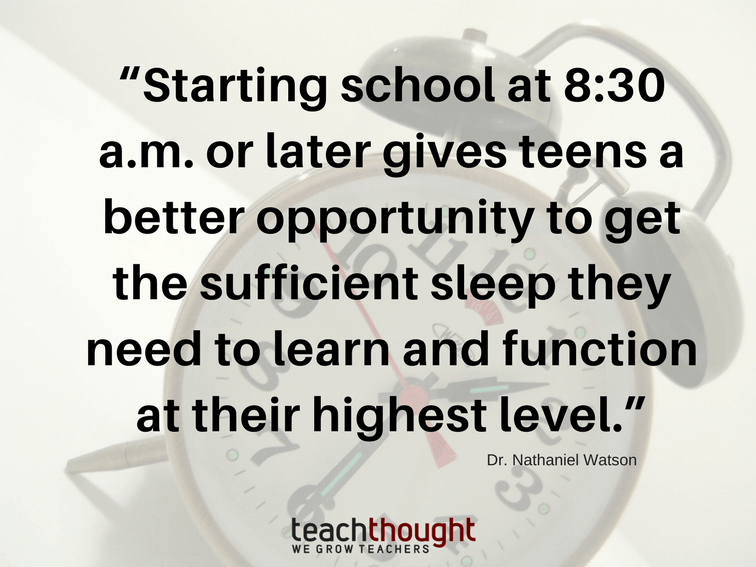Sleep Experts Agree: School Starts Too Damn Early
by TeachThought News Staff
Every few years, sleep research emerges that confirms what we already seem to know: quality sleep is important.
This is especially visible in education, where teachers can see first-hand the consequences of sleepy students. The reality of a student having to wake up at 4:30 a.m. to catch a 6 a.m. bus for an hour ride to school isn’t as far-fetched as it’d seem.
Further, teachers can both contribute to the problem (assign a lot of homework to students with an already-busy schedule) and suffer in parallel. Sleepy students have greater difficulty focusing, recalling information, staying engaged, and more. They can provide, ahem, ‘behavioral challenges’ as well.
A new position statement from the American Academy of Sleep Medicine (AASM) seeks to change that with a formal recommendation that the school day should begin at 8:30 a.m. or later for middle school and high school students–which ideally could mean you’d get to sleep a bit later too unless that time difference somehow turned into a staff meeting of some kind.
Sleep Experts Recommend Later Start Time For School
The AASM encourages primary academic institutions, school boards, parents, and policymakers to raise public awareness to promote a national standard of middle school and high school start times that will help ensure that middle school and high school students begin the day awake, alert, and ready to learn.
“Early school start times make it difficult for adolescents to get sufficient sleep on school nights, and chronic sleep loss among teens is associated with a host of problems, including poor school performance, increased depressive symptoms, and motor vehicle accidents,” said lead author and AASM Past President Dr. Nathaniel Watson.
“Starting school at 8:30 a.m. or later gives teens a better opportunity to get the sufficient sleep they need to learn and function at their highest level.”
Official Recommendations For Sleep For Teenagers
The AASM recommends that teenagers 13 to 18 years of age should sleep 8 to 10 hours on a regular basis to promote optimal health. However, CDC data show that 68.4 percent of high school students report sleeping 7 hours or less on school nights. Early middle school and high school start times work contrary to adolescent circadian physiology and truncate students’ sleep opportunity, resulting in chronic sleep loss.
Studies show that short sleep in adolescents is associated with the following:
- Poor school performance
- Obesity; metabolic dysfunction & cardiovascular morbidity
- Depression
- Suicidal ideation
- Risk-taking behaviors
- Athletic injuries
Benefits Of Later Start Times For Schools
Insufficient sleep also is associated with an increased risk of motor vehicle accidents, which account for 35 percent of all deaths and 73 percent of deaths from unintentional injury in teenagers. Research suggests that crash rates decline by 16.5 percent following a school start time delay of 60 minutes.
Delaying middle school and high school start times is associated with a variety of benefits for teen students:
- Longer total sleep time/reduced daytime sleepiness
- Increased engagement in class activities
- Reduced first-hour tardiness and absences
- Reduced depressive symptoms and irritability
Quality Of Sleep Matters, Too
The authors noted that while adequate sleep duration is vital, other sleep-related factors are involved in ensuring optimal student performance. Maintenance of good sleep quality, appropriate timing and regularity of sleep, and effective treatment of sleep disorders are essential. Teens also should avoid using sleep-disrupting electronic devices near bedtime or during the night, as blue light emitted from these devices can suppress melatonin production and delay onset of REM sleep.
And unless teens are using blue light-blocking glasses (these are actually a thing) also should avoid using sleep-disrupting electronic devices near bedtime or during the night, as blue light emitted from these devices can suppress melatonin production and delay onset of REM sleep.
The position statement is published in the April 15 issue of the Journal of Clinical Sleep Medicine.
Have a news tip? Email us and let us know!

